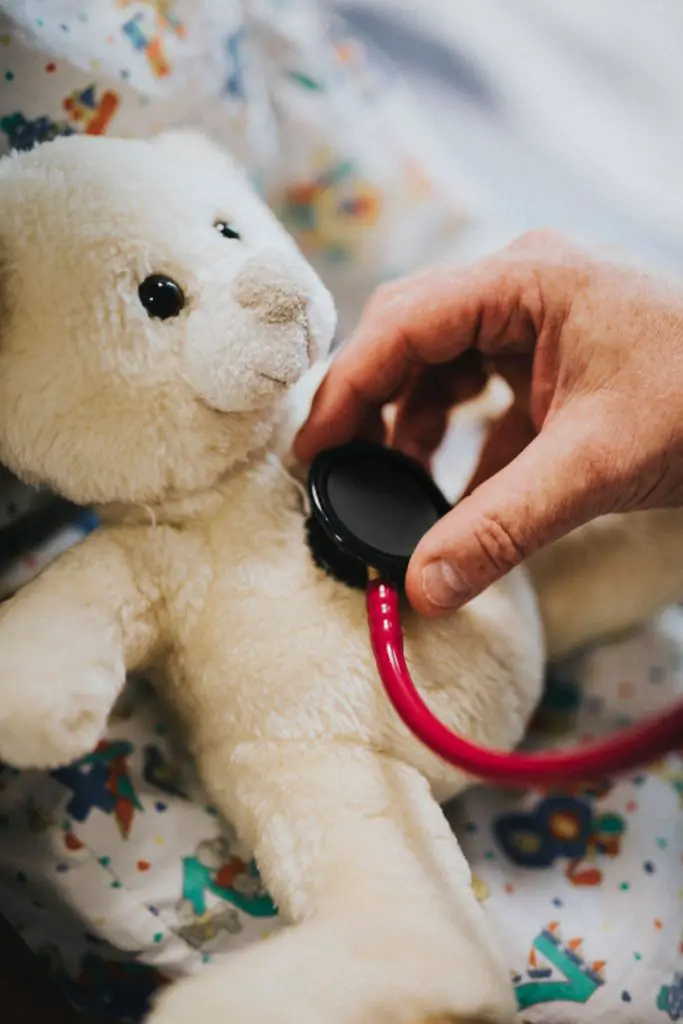I’ve seen my fair share of doctors for severe food allergies, between looking for help for myself and my two kids with FPIES (a rare type of severe food allergy). There are several types of specialists that can diagnose and treat severe food allergies, such as allergists, immunologists, and gastroenterologists. These doctors specialize in different areas, and may be able to better treat patients who fall into their area of expertise. If you or your child has an IgE allergy, an allergist could do skin prick or other allergy tests and treat symptoms accordingly. If the allergy is IgG mediated, or it causes mainly gastrointestinal issues, you may need a Gastroenterologist to manage symptoms and treat inflammation in the gut.
A nutritionist is also a very valuable team member, because they can help you manage food trials and make sure your child is getting enough calories and balanced nutrition.
How to Get Started With a Specialist for Food Allergies
When my kids were younger and we were looking for a team of doctors that could help manage their FPIES, I had no idea who could help us, or even what kinds of doctors we should be looking for. For us, the first step was having a supportive pediatrician that we love and trust. He manages our minor symptoms and helped us in the early days when we needed to try different types of formula while we were waiting to get in at the GI doctor. Our Pediatrician also gives us referrals to other doctors and is usually able to recommend specific doctors that he trusts and who take our insurance.
Here in the US, it’s common for specialists and insurance companies to require a referral. You may need to call your insurance company and the specialists you need to see if they require referrals. If so, you can start with your primary care doctor (or Pediatrician if your child is the one with allergies). They can see you or your child and determine if a specialist is necessary, and if so they can make the best referral for your area. They can also check with your insurance to make sure that the specialist they refer you to is in network for your insurance plan.
If your insurance doesn’t require a referral, and the specialist you are going to see doesn’t require one either, you can usually call their office and make an appointment directly. It can require a little extra effort and research on your part up front, but you can find helpful doctors this way if you are willing to do the research.

Allergists Can Help with IgE Food Allergies
A board certified Allergist/Immunologist can be especially helpful if you are dealing severe allergies. They can diagnose and treat many different types of allergies, including food and environmental allergies (like grass, tree, mold, or pet dander allergies). They usually listen to your history, look at any visible symptoms, and determine what types of testing you may need. Allergists can usually perform skin prick testing in their office. This test shows the level of histamine response your body has to certain foods. They can also do bloodwork to check for inflammation, histamine levels, or a number of different diseases.
The doctor will order tests based on what symptoms you or your child have and what foods you feel are causing issues. Usually at the first appointment, a scratch test (skin prick test) will be done to see if there are any IgE allergies. Tiny amounts of potential allergens are placed on a plastic toothpick and scratched on the surface of the skin. If there is enough space and the child is old enough, this is done on the forearm. For smaller kids and babies, it’s usually done on the back. This isn’t usually painful, but it is irritating – especially if the person does have an IgE allergy to one of the foods they are testing for, because that area will turn into an itchy welt – like when you get a mosquito bite.
The test is read by comparing the control spot, which is pure histamine that’s scratched on the skin, with the welts or hives that show up from each allergen. If the welt from an allergen (dairy, soy, nuts, etc.) is the same size or larger than the welt from the pure histamine, that person likely has an IgE allergy to that item.
There are a large number of kids and babies with severe food allergies like FPIES who have little or no reactions to a scratch test. If this is the case, the doctor may order a blood test to rule out any borderline reactions from the scratch test, and to check for any other issues that might be lurking. Sometimes blood tests are done when a small reaction shows up and the doctor wants to double check that it wasn’t a false positive result.
After listening to your child’s history and reviewing the test results, some doctors may diagnose your child with an allergy or condition on the spot. If this is the case, they can also usually recommend a treatment plan to help. Sometimes there are prescription medicines that can be prescribed to help manage symptoms of an allergic reaction, and sometimes allergy shots are recommended.
If the symptoms are mostly GI related, or the scratch test is all negative and blood work is inconclusive, you may be referred to a Gastroenterologist to look for an intolerance or other potential issues.
Gastroenterologists Can Help With Intolerances and IgG Allergies
Some people start with a Gastroenterologist (GI) doctor. This can be a good place to start if the symptoms you are seeing are mainly digestive (vomiting, diarrhea, etc.). Even if you start with a GI doctor, you may eventually be sent to an allergist for a scratch test. Some allergists won’t do scratch testing on smaller babies though, so some people start with a gastroenterologist for severe allergies out of necessity.
A GI doctor can diagnose and treat a wide variety of IgG allergies, intolerances, and gastrointestinal diseases like Chron’s or Celiac Disease. Typically, a gastroenterologist will ask for your medical history and symptoms, and then recommend bloodwork or testing as necessary. Testing can include x-rays, cat scans, or upper or lower endoscopies. This helps the doctor see if there is internal inflammation or damage. Depending on the diagnosis, there may be medication treatments available, or the doctor may recommend a change in your diet.
One important note; if you are seeing a GI doctor, stay on the diet you’ve been on as much as possible until after they have talked to you and done any necessary testing. This is especially true if they will be doing bloodwork or a scope to check for inflammation or Celiac disease. If you stop eating wheat before the tests are run, the test may show a false negative.
Seeing a Gastroenterologist for a Baby or Small Child
One great thing about seeing a GI doctor is they can do lots of testing to rule out diseases or issues that might be causing digestive upset for your child. They will document weight and height to measure where your child fits on the growth curve and to make sure that they aren’t considered “failure to thrive”.
One test they might want to do is a scope or biopsy to check for inflammation, damage, or birth defects in the GI tract. Sometimes there is a structural issue that causes vomiting, diarrhea, or severe pain in babies, and it’s important to rule those things out. Usually this will require a special appointment with a testing center or outpatient surgery clinic, and your doctor can give you an idea of what to expect for these tests.
A gastroenterologist can also help you find a formula that won’t cause a reaction. There are several options for babies that have reactions to typical formulas, and a GI can help you figure out which one is right for you. This may take some trial and error, and most pediatric GI offices have samples of these different brands of formulas that they can give you to try. They will also sometimes prescribe medicines that can help with some of the peripheral symptoms (like reflux, rashes, etc) that babies have as a result of severe food allergies.
Other Helpful Professionals You May Need to See for Food Allergies
I’ve already talked about the different types of specialists that help manage our family’s food allergies, but there are several other medical professionals who also helped us a lot.

Nutritionist
One of the most valuable team members for us was also our nutritionist. The nutritionist that we see works out of the GI office, and she has been a lifesaver (literally). Usually, the nutritionist is the one that can look at the list of foods you have trialed to help you find patterns. This can help you figure out what foods to try next. One of the hardest things about food intolerances, specifically FPIES for us, is that sometimes there is no rhyme or reason behind reactions, and reactions can be different for every single kid. There are families with siblings and even identical twins where the kids react to totally different foods, so having someone who can look with a fresh eye at the different types of reactions your child has had is a really valuable asset.
A nutritionist can also help you figure out how many calories your baby is getting per day. If you are breastfeeding and need to be on an elimination diet, they can help you make sure that you are getting enough calories a day to help pass on nutrition for your baby.
If your baby is not getting enough calories, they can help you figure out what foods to trial next to add in calories or vitamins, etc. If it had been up to me, I would have just been trying new foods with my kids according to what came in baby food jars that my local store sold, or what was convenient or fit into our budget. When our nutritionist went through the list of foods we had tried and what reactions my kids had to each food, she had some very specific directions for us for our next trials to help us gain fats and green veggies and to help us avoid foods similar to the ones that made my babies sick.
Chiropractor
Another doctor that we utilized early on for both of my kids was a Chiropractor. This is a somewhat controversial choice – some people love their chiropractor and swear it has helped, and some people don’t see any difference at all and spend lots of time and money going to see them over long periods of time. Some families get to a place where they are willing to try alternative therapies and techniques because they’ve exhausted other options. That’s up to each family, but my advice would be to tread carefully and look for providers that have proper schooling and credentials and come recommended by others who have used them.
We used a chiropractor for craniosacral therapy (CST) for my kids when they were tongue tied based on some recommendations from others who had been through a similar process. While it definitely didn’t hurt my kids or make things worse, I am not totally convinced that it helped that much. I did enjoy going because the chiropractor was very knowledgeable about food allergies and we did get some good direction from her. I do believe that she helped a lot with the gas and constipation issues my son had as a tiny baby, but it didn’t help us solve the root problem which was the food allergy. Once we got him on a stable formula that he didn’t react to, we stopped going to the chiropractor because most of the issues they were helping with were resolved on their own.
Feeding Therapist/Speech Language Pathologist
One last addition some people need in their FPIES treatment team is a feeding therapist. Not all FPIES babies or kids will need someone to help with feeding therapy, but there are quite a few who will need some extra assistance. This is for kids who are beyond picky eaters; kids with total food aversions, texture issues (such as gagging or choking when they eat mushy foods), and kids with structural issues to their tongue or palate (tongue tied kids or babies with cleft or high palates). A feeding therapist can do an evaluation of your child while they eat, and can make a plan of specific recommendations to help with different issues.
Our feeding therapist had us bring in foods that were safe and that had a variety of textures. We would work through several different textures each week. She also had recommendations for exercises we could do at home to help desensitize my daughter’s sensory issues when it came to food. This really helped open us up to try new foods with her that we couldn’t get her to try before.
How to Choose Great Doctors for Food Allergies
Not every child is the same, so you may not need help from every specialist mentioned above. Some babies and adults with allergies only have one or two foods to avoid. They may be able to manage food trials at home with support from just a pediatrician or a gastroenterologist. Other people may be allergic or intolerant to many foods and may need support from several specialists.
Finding doctors that can give you or your child the help you need can be a long process, sometimes with lots of trial and error. We’ve learned along the way that there are some things you can do to make the process easier and more successful.
- Narrow down what type of specialists you think you might need to see. Make a list of symptoms that concern you and share this with your pediatrician to ask for any necessary referrals.
- Do your own research. Sometimes it’s helpful to do this before going to the pediatrician so you have a list of potential doctors that have some knowledge of what you are looking for. It’s not as helpful to get a referral for a gastroenterologist if you are referred to someone who has never heard of your condition or treated anyone with it. This mostly applies if you have a more rare food allergy like FPIES or EoE, but it holds true for anyone with a condition that needs specific guidance like Chron’s or Celiac Disease.
- If you are going to pursue alternative therapies, ask for recommendations from others that have used the specific provider that you are looking into. Look for proper credentials for each person you are seeing. Be wary of anyone trying to push supplements or products that they will get a financial kickback from, especially if they can’t give you sound medically based reasoning for it.
- If possible, find other people in your area who have seen the doctor you have been referred to. Ask them about their experiences, check google reviews, and go in with an open mind. Most doctors want to help their patients feel better, but sometimes complex patients are hard to treat and doctors can be busy. Try to find a doctor that listens and can connect the dots between the symptoms you have, and who is qualified to treat you or your child.


